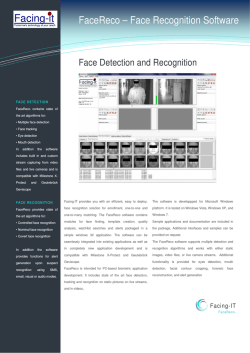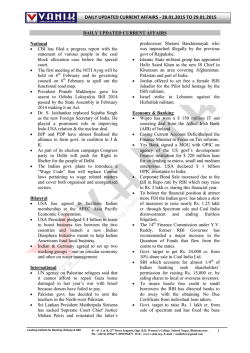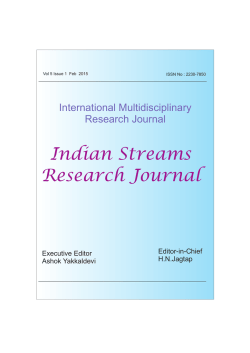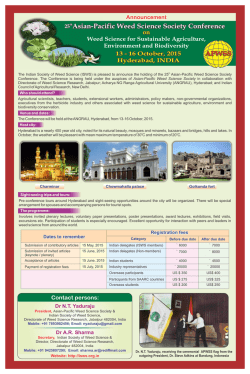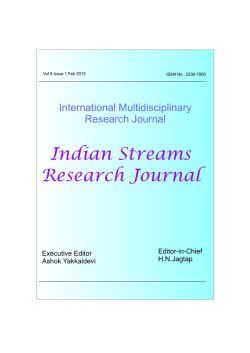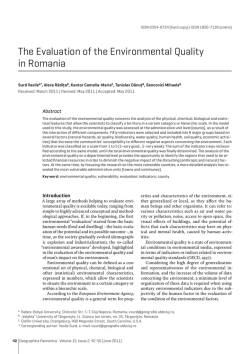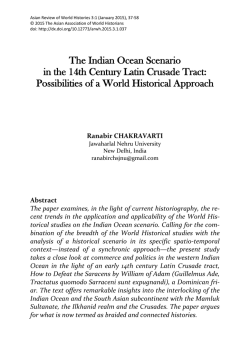
Download PDF
Vol 5 Issue 1 Feb 2015 ISSN No : 2230-7850 ORIGINAL ARTICLE International Multidisciplinary Research Journal Indian Streams Research Journal Executive Editor Ashok Yakkaldevi Editor-in-Chief H.N.Jagtap Welcome to ISRJ RNI MAHMUL/2011/38595 ISSN No.2230-7850 Indian Streams Research Journal is a multidisciplinary research journal, published monthly in English, Hindi & Marathi Language. All research papers submitted to the journal will be double - blind peer reviewed referred by members of the editorial board.Readers will include investigator in universities, research institutes government and industry with research interest in the general subjects. International Advisory Board Flávio de São Pedro Filho Federal University of Rondonia, Brazil Mohammad Hailat Dept. of Mathematical Sciences, University of South Carolina Aiken Hasan Baktir English Language and Literature Department, Kayseri Kamani Perera Regional Center For Strategic Studies, Sri Lanka Abdullah Sabbagh Engineering Studies, Sydney Ghayoor Abbas Chotana Dept of Chemistry, Lahore University of Management Sciences[PK] Janaki Sinnasamy Librarian, University of Malaya Ecaterina Patrascu Spiru Haret University, Bucharest Romona Mihaila Spiru Haret University, Romania Loredana Bosca Spiru Haret University, Romania Delia Serbescu Spiru Haret University, Bucharest, Romania Fabricio Moraes de Almeida Federal University of Rondonia, Brazil Anurag Misra DBS College, Kanpur Anna Maria Constantinovici AL. I. Cuza University, Romania Ilie Pintea, Spiru Haret University, Romania Xiaohua Yang PhD, USA George - Calin SERITAN Faculty of Philosophy and Socio-Political Sciences Al. I. Cuza University, Iasi ......More Titus PopPhD, Partium Christian University, Oradea,Romania Editorial Board Iresh Swami Pratap Vyamktrao Naikwade ASP College Devrukh,Ratnagiri,MS India Ex - VC. Solapur University, Solapur R. R. Patil Head Geology Department Solapur University,Solapur Rama Bhosale Prin. and Jt. Director Higher Education, Panvel Salve R. N. Department of Sociology, Shivaji University,Kolhapur Govind P. Shinde Bharati Vidyapeeth School of Distance Education Center, Navi Mumbai Chakane Sanjay Dnyaneshwar Arts, Science & Commerce College, Indapur, Pune Awadhesh Kumar Shirotriya Secretary,Play India Play,Meerut(U.P.) N.S. Dhaygude Ex. Prin. Dayanand College, Solapur Narendra Kadu Jt. Director Higher Education, Pune K. M. Bhandarkar Praful Patel College of Education, Gondia Sonal Singh Vikram University, Ujjain Rajendra Shendge Director, B.C.U.D. Solapur University, Solapur R. R. Yalikar Director Managment Institute, Solapur Umesh Rajderkar Head Humanities & Social Science YCMOU,Nashik S. R. Pandya Head Education Dept. Mumbai University, Mumbai Alka Darshan Shrivastava G. P. Patankar S. D. M. Degree College, Honavar, Karnataka Shaskiya Snatkottar Mahavidyalaya, Dhar Maj. S. Bakhtiar Choudhary Director,Hyderabad AP India. Rahul Shriram Sudke Devi Ahilya Vishwavidyalaya, Indore S.Parvathi Devi Ph.D.-University of Allahabad S.KANNAN Annamalai University,TN Sonal Singh, Vikram University, Ujjain Satish Kumar Kalhotra Maulana Azad National Urdu University Address:-Ashok Yakkaldevi 258/34, Raviwar Peth, Solapur - 413 005 Maharashtra, India Cell : 9595 359 435, Ph No: 02172372010 Email: [email protected] Website: www.isrj.org Indian Streams Research Journal ISSN 2230-7850 Impact Factor : 3.1560(UIF) Volume-5 | Issue-1 | Feb-2015 Available online at www.isrj.org A STUDY ABOUT “STRESS MANAGEMENT TECHNIQUE WITH SPECIAL REFERENCE TO THE SCHOOL TEACHERS” 1 Vivek and Arul Edwin Fredrick.P 2 1 Department of Management Studies, Anna University, Regional Office, Madurai. 2 MBA, Anna University, Regional Office, Madurai. Abstract:-Despite much discussion concerning the nature of workplace stress, our jobs are getting more and not less stressful. While stress certainly isn't unique to the teaching profession, working in schools does throw up a number of situations that are unique to education while the current climate of uncertainty and criticism further undermines the professionalism and confidence of many hard working teachers. Ofsted inspections, changes to pay and conditions and new appraisal systems all add to the feeling that we are far from in control. Identifying those things that we can control and those that we cannot could help to prevent daily hassles from becoming major problems; but we can't do it on our own. Keywords: Teaching, Stress, Professionalism, Appraisal Systems. INTRODUCTION Stress is a natural biological response and back in the day when wild animals roamed freely and early humans spent much of their time hunting and gathering the body's response to stress was vital for our survival. Stress allows our biological system to prepare itself to do something – either attack (fight) or run away (flight). Acute stress represents that immediate panic which drives the fight or flight response but if this stress continues we begin to suffer from a more chronic condition, this can not only impact on us psychologically but can also lower our immune system, making us more vulnerable to physical illness. REASON FOR STRESS Psychologically, the stress we feel is often based on our individual perception of a situation and this is why some people appear to suffer more than others. American psychologist Julian Rotter describes this as our 'locus of control' or the extent to which an individual feels that they have control over a situation. Locus of control can be internal, in that we believe we have control over our lives, or external, where we believe that the environment controls events. Realistically most of us fall between these two dimensions but we may favour a particular one. Unfortunately, our locus of control is very difficult to change because it probably developed through a combination of genetics and early socialisation. Some things we can influence more than others and quite often the trick is in identifying which is which and concentrating our efforts on the things we can actually do something about. Constantly striving for the elusive worklife balance can often increase these levels of stress and for some it might be more appropriate to abandon the quest altogether. The Practical Scenario Sadly, many of the stress management techniques on offer simply aren't practical in a school setting. There is little to suggest that any organisation that runs after hours yoga classes or adventure training days is contributing anything to the reduction of stress in any real terms; the main issue faced by teachers is workload and the work will Vivek1 and Arul Edwin Fredrick.P2 ,“ A STUDY ABOUT “STRESS MANAGEMENT TECHNIQUE WITH SPECIAL REFERENCE TO THE SCHOOL TEACHERS” ” Indian Streams Research Journal | Volume 5 | Issue 1 | Feb 2015 | Online & Print 1 .A Study About “Stress Management Technique With Special Reference To The School Teachers” still be there even after the yoga. While cognitive techniques like reframing the problem work for some people, others find that a more practical response is required. Similarly, stress management tends to treat the symptoms of stress rather than identifying and tackling its causes. More practical perhaps are what are called 'daily uplifts', those little treats we give ourselves at points during the day; everything from a five minute sit-down with a cup of tea to a 10 minute walk at lunchtime. If workload is the main reason for our levels of stress and anxiety then our efforts are best directed towards finding ways of taking control of it and making it more manageable. Reducing workload is easier said than done but remember that asking for help isn't a sign of weakness and there are many resources out there to lighten the load. Getting involved with the growing number of teachers using Twitter for support and advice is also a simple and free way of discovering that you're not alone. The benefits, be they financial or in terms of academic achievement, of a healthy and happy school should be obvious to all and headteachers who are serious about long-term investment in their staff must play a major role in tackling stress through prevention rather than management. If a major cause for stress in the feeling that we are losing control, how can head teachers attempt to restore that sense of control? Involving staff in decisions that impact on them can help. Training and professional development is an area where teachers often feel they are wasting valuable time so consulting with staff about what they feel they need hands much of the control back. What about those meetings that appear to be scheduled for no good reason? If they are necessary, keep them brief; if they aren't then find another way of getting the information to all relevant parties. Finally, remember that what we really need to understand in that successfully tackling stress isn't just about individuals, it's about the whole school; and this requires a serious combined initiative, not just another box to tick. Causes of Work Related Stress for Teachers There are many sources of teacher stress. Some of the causes are given below: •Pressure on professional skills (e.g. introduction of new teaching methods, changes in curriculum and courses); •Students (e.g. increased class size per teacher, lack of pupil motivation, attention and interest, having to meet new teaching targets or student attainment levels); •Difficult parent/teacher relations (perhaps from new demands regarding roles of the teacher or decreased parent participation); •Poor planning and programming (e.g. constant restructuring, frequent reforms in the vocational educational system, working alone and the transition to team work, lack of personnel and poor allocation, strong administrative hierarchy with a lack of support, insufficient financial resources); •Social and personal pressures (such as concerns about the quality of education, lack of coherence between personal goals and professional obligations, no recognition or acknowledgement, lack of public esteem); •The school as a stressful workplace (from excessive workload and hours of work, lack of time, lack of control and autonomy, environmental noise, poor ventilation, lack of solidarity and morale, excessive paperwork and administrative duties); and •Economic pressures (inadequate salary, job insecurity). Stress Management for Teachers The following is a list of tips I would recommend as stress management for teachers: 1. Keep Calm I was once told that you should never get angry at children or animals. I still totally agree. If you feel really angry or upset in class give yourself time to feel it later on when you are alone or away from the children. Releasing when you are alone is fine it’s just not such a good idea in class as this will just create more stress. The meditation teacher Ajahn Chah once told his abbots that to be a teacher was to be like a rubbish bin. The trick was, he said, to be a bottomless bin. No matter what people dump in you just let go. Don’t hold onto it or take it personally. Remember the kids have their own stuff which they are probably dealing with by dumping on you. Remember to see their pain and compassion will spring from your heart. Indian Streams Research Journal | Volume 5 | Issue 1 | Feb 2015 2 .A Study About “Stress Management Technique With Special Reference To The School Teachers” 2. Practice Stress Relief Regularly If you don’t practice meditation then please go here to learn. Meditation is a wonderful way of dealing with stress. Not only does it give you perspective but it also calms and relaxes you. Get into a routine of practicing stress management. There is lots more free info on this site – please use it. Take charge of stress rather than stress taking charge of you! 3. Be Centered Before Going into Class If you don’t feel good, or are upset and angry then the kids will pick up on it. They know because they are really sensitive. This will potentially make your day difficult if they decide to prod you! Before going into class spend a few minutes centering yourself: •Focus your attention 2 fingers’ breadth below the belly button. •Breathe in 4 short intakes of air to that point. Keep your focus there. •Hold your breath and tense your stomach muscles 4 times. •Breathe out 4 short breaths while keeping your focus there. •Do this for a few minutes and you should feel very centered 4. Compassion Another good stress management for teachers technique is to be compassionate. Have compassion for the children. They might be going through a hard time at home or with friends and a lot of children are not good at expressing this. Rather than speak about it, they let it build and place this emotion onto others. There is a Tibetan Buddhist teacher called Pema Chodron. She teaches a technique called Tonglen. The idea is that you breathe in others pain and breathe out love and compassion. This technique was used by many Tibetan monks during their persecution by the Chinese. •You are confronted with a difficult student; they are angry, stressed or anxious. •You consciously breathe in their darkness or their pain. •You then breathe out a white light, love, compassion, joy, equanimity from your heart. •You then breathe in the pain and darkness of everyone in the world. •You breathe out healing and light to all beings. It really is very simple and you will find your heart opening in joy and love rather than closing down in fear and pain. Try it now and see how well it works. Think of someone in pain and do it for them. 5. Laugh with the Class Have you ever fallen over or done something stupid in class? Has the class burst out in laughter? Did you laugh with them? If this does happen again go with the flow and laugh. Not only do you have fun but you keep control of the situation and you keep the kids' respect (even if you looked a bit funny at the time!) 6. Boundaries I once worked in a school in as a teaching assistant. I got to drop in on different classes. The teachers who had firm boundaries and stuck to them were respected, had order and didn’t get stressed. The teachers who didn’t have boundaries had no control over their classes and were stressed to the hilt. If you set a boundary, stick to it and the class will start to have more respect for you. 7. Consistency It is important for you to be consistent with your class. If you allow one thing one day and not the next, the children will get confused. Children like to know where they stand. They push the boundaries so they can feel secure Indian Streams Research Journal | Volume 5 | Issue 1 | Feb 2015 3 .A Study About “Stress Management Technique With Special Reference To The School Teachers” knowing where they are. Stay consistent and you will see the class respecting you more and your stress levels going down. CASE STUDY - PREVENTING STRESS AND BURNOUT AMONG TEACHERS Teaching children with serious social and emotional problems in an education and treatment centre is difficult. The children can be aggressive and violent, which places heavy demands and emotional strain on their teachers. This can result in stress, anxiety, tiredness, depression and burnout. Special needs education is a priority area for taking action on psychosocial risks. It is an example of where the risk of violence cannot be completely removed, so the need for good management is high. In one case in Denmark the following actions were taken: •Teachers were given systematic continuous training and development on how to manage the risk; •All staff and managers had an annual development plan; •Staff received training in communication skills; •Induction training was given to new staff; •Communication was improved by putting in place feedback mechanisms to management ;role-playing was used as a method to learn how to develop responses to help prevent problems with children; •An open and respectful environment was created so that colleagues could express their views and others respond; •Following a physical confrontation, there was discussion with colleagues and managers. The school management was involved and the staff member was also given the option of seeing a crisis psychologist. As a result of these actions: •there was a reduction in the number of physical confrontations between children and staff •staff absence was cut •teachers were less frustrated and more satisfied •children were happier and less aggressive (European Agency, 2002). CONCLUSION Thus stress plays a vital role in affecting the performance and characteristics of a teacher at school setting. It may arise due to various reasons depending upon the individual. The way to approach or tackle stress is by applying the stress management techniques in a more practical way rather than the traditional way. Considerable results have been arrived at by being more practical towards tackling stress at school setting. As the saying goes “Practice makes a man perfect”, the management of stress and its associates that toil teachers can only be achieved only through regular practice of those above mentioned techniques. By following those techniques on a regular basis the stress can be effectively managed. Teachers are an important asset of society as they are involved in educating the children who are the future generation. Their well being is directly proportional to the future of the children. A stress-free setup would be an ideal environment for both the teachers and their pupils. It is a three dimensional advantage, dimensions being teachers, students and society. REFERENCES 1.http://www.theguardian.com/teacher-network/teacher-blog/2013/jul/08/psychology-stress-school-teachingimpact 2.http://www.stress-relief-choices.com/stress-management-for-teachers.html 3.https://osha.europa.eu/en/faq/education-2/what-causes-work-related-stress-in-teachers 4.Schaarschmidt, U (ed.) Halbtagsjobber ?, Psychische Gesundheit im Lehrerberuf – Analyse eines veränderungsbedürftigen Zustandes. Weinheim; Basel: Beltz, 2. Auflage 2005. 5.Smith, A., Brice, C., Collins, A., Mathews, V., and McNamara, R., The scale of occupational stress. A further analysis of the impact of demographic factors and type of job, HSE Books, UK, 2000. 6.Verdugo, R., Vere, A., International Labour Office 2003, Workplace violence in service sectors with implications for the education sector: Issues, solutions and resources 2003 http://www.ilo.org/public/english/dialogue/sector/papers/education/w p208.pdf Indian Streams Research Journal | Volume 5 | Issue 1 | Feb 2015 4 Publish Research Article International Level Multidisciplinary Research Journal For All Subjects Dear Sir/Mam, We invite unpublished Research Paper,Summary of Research Project,Theses,Books and Book Review for publication,you will be pleased to know that our journals are Associated and Indexed,India ¬ International Scientific Journal Consortium ¬ OPEN J-GATE Associated and Indexed,USA ? Google Scholar ? EBSCO ? DOAJ ? Index Copernicus ? Publication Index ? Academic Journal Database ? Contemporary Research Index ? Academic Paper Databse ? Digital Journals Database ? Current Index to Scholarly Journals ? Elite Scientific Journal Archive ? Directory Of Academic Resources ? Scholar Journal Index ? Recent Science Index ? Scientific Resources Database ? Directory Of Research Journal Indexing Indian Streams Research Journal 258/34 Raviwar Peth Solapur-413005,Maharashtra Contact-9595359435 [email protected]/[email protected] Website : www.isrj.org
© Copyright 2026
